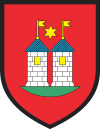Poniec
Poniec [ˈpɔɲet͡s] (German: Punitz) is a town situated in the southern part of the Greater Poland Voivodeship (since 1999), formerly in Leszno Voivodeship (1975-1998), in Poland. The town has about 3,000 inhabitants. It is the capital of a commune in Gostyń County.
Poniec | |
|---|---|
Town Hall (Ratusz) at the Market Square (Rynek) | |
 Coat of arms | |
 Poniec  Poniec | |
| Coordinates: 51°45′30″N 16°49′0″E | |
| Country | |
| Voivodeship | |
| County | Gostyń |
| Gmina | Poniec |
| First mentioned | 1108 |
| Town rights | before 1309 |
| Area | |
| • Total | 3.54 km2 (1.37 sq mi) |
| Population (2006) | |
| • Total | 2,875 |
| • Density | 810/km2 (2,100/sq mi) |
| Time zone | UTC+1 (CET) |
| • Summer (DST) | UTC+2 (CEST) |
| Postal code | 64-125 |
| Website | http://www.poniec.pl/ |
History
Poniec dates back to the 10th century, when it was part of the emerging Polish state. The oldest known mention comes from 1108.[1] It was granted town rights before 1309. Crafts, especially clothmaking, developed and the town prospered until the Swedish invasion of Poland in 1655–1660.[1] The Battle of Poniec occurred nearby on 28 October 1704 during the Great Northern War.
After the Second Partition of Poland, in 1793 it was annexed by Prussia. Regained by Poles in 1807, it was included in the short-lived Polish Duchy of Warsaw, in 1815 it was re-annexed by Prussia. The local population was subjected to harsh Germanisation policies, however local Poles established various organizations, including a local branch of the "Sokół" Polish Gymnastic Society.[1] Many inhabitants took part in the Greater Poland uprising (1918–19), after which Poniec was reintegrated with Poland in 1919, shortly after it regained independence.[1]
During the invasion of Poland, which started World War II, German troops entered the town on 6 September 1939.[1] The Polish population was subjected to arrests, executions and expulsions. In the following months, many residents were imprisoned in the town hall.[1] On 21 October 1939 the Germans carried out a public execution of local Poles.[2] Over 300 Poles were expelled to the General Government, mostly to Tarnów.[1] First Polish families were expelled in December 1939.[1] Many inhabitants were taken to forced labour or murdered in Nazi concentration camps.[1] The town was captured by the Soviets in January 1945 and afterwards restored to Poland.
People
- Edmund Charaszkiewicz (1895-1975), intelligence officer
References
- "Historia Ponieca". Poniec.pl (in Polish). Retrieved 1 March 2020.
- Maria Wardzyńska, Był rok 1939. Operacja niemieckiej policji bezpieczeństwa w Polsce. Intelligenzaktion, IPN, Warszawa, 2009, p. 198 (in Polish)